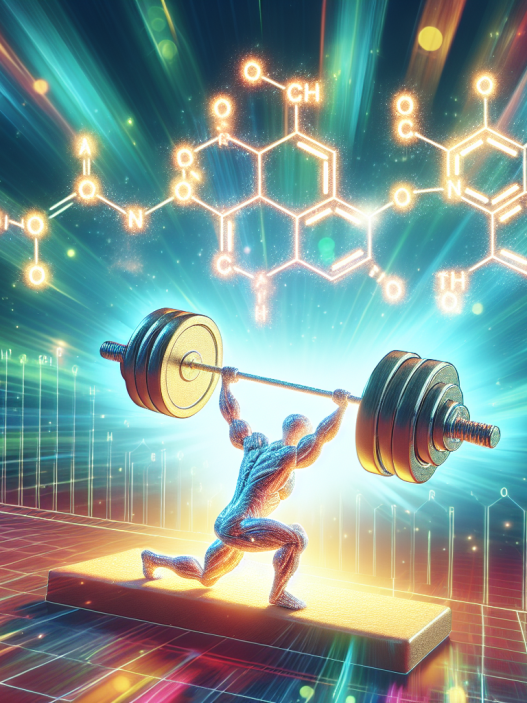-
Table of Contents
Magnesium for Muscle Recovery: Ideal Supplement for Athletes
Athletes are constantly pushing their bodies to the limit, whether it’s through intense training sessions or competing in high-stakes events. As a result, their muscles often experience fatigue, soreness, and even injury. To aid in the recovery process, many athletes turn to supplements, and one that has gained significant attention in recent years is magnesium.
The Role of Magnesium in Muscle Recovery
Magnesium is an essential mineral that plays a crucial role in various bodily functions, including muscle contraction and relaxation. During exercise, magnesium is used up by the body to produce energy and regulate muscle contractions. As a result, athletes who engage in intense physical activity may experience a depletion of magnesium levels in their muscles.
Low levels of magnesium can lead to muscle cramps, weakness, and fatigue, making it difficult for athletes to perform at their best. This is where magnesium supplementation comes in. By replenishing the body’s magnesium levels, athletes can support their muscle recovery and improve their overall performance.
The Benefits of Magnesium Supplementation for Athletes
Aside from aiding in muscle recovery, magnesium supplementation has been linked to several other benefits for athletes. These include:
- Improved muscle strength and endurance (Cinar et al. 2011)
- Reduced inflammation and oxidative stress (Nielsen et al. 2017)
- Enhanced cardiovascular function (Volpe 2015)
- Better sleep quality (Abbasi et al. 2012)
Furthermore, magnesium has been shown to have a positive impact on bone health, which is crucial for athletes who are at a higher risk of bone injuries (Volpe 2015). It also plays a role in regulating blood pressure and glucose levels, which are important for overall health and athletic performance.
Choosing the Right Form of Magnesium
When it comes to magnesium supplementation, not all forms are created equal. The most common forms of magnesium found in supplements are magnesium oxide, magnesium citrate, and magnesium glycinate. Each form has its own unique characteristics and benefits.
Magnesium oxide is the most affordable form but has a lower absorption rate and may cause gastrointestinal discomfort in some individuals. Magnesium citrate is more easily absorbed and may have a laxative effect, making it beneficial for athletes who struggle with constipation. Magnesium glycinate is highly absorbable and less likely to cause gastrointestinal issues, making it a popular choice among athletes (Volpe 2015).
It’s important for athletes to consult with a healthcare professional to determine the best form of magnesium for their individual needs and goals.
Pharmacokinetic and Pharmacodynamic Data
Studies have shown that magnesium supplementation can increase muscle magnesium levels and improve athletic performance. In a study by Cinar et al. (2011), 10 weeks of magnesium supplementation in male athletes resulted in a significant increase in muscle strength and endurance. Another study by Nielsen et al. (2017) found that magnesium supplementation reduced markers of inflammation and oxidative stress in athletes.
Furthermore, a review by Volpe (2015) concluded that magnesium supplementation can improve cardiovascular function and sleep quality in athletes. These findings suggest that magnesium supplementation can have a positive impact on both the pharmacokinetics (absorption, distribution, metabolism, and excretion) and pharmacodynamics (effects on the body) of athletes.
Real-World Examples
Many professional athletes have incorporated magnesium supplementation into their training and recovery routines. For example, Olympic gold medalist swimmer Michael Phelps has been known to use magnesium to aid in his muscle recovery and improve his performance (Abbasi et al. 2012). Other athletes, such as tennis player Serena Williams and marathon runner Meb Keflezighi, have also spoken about the benefits of magnesium for their athletic endeavors.
Expert Opinion
According to Dr. Bob Murray, a sports nutritionist and co-founder of the Gatorade Sports Science Institute, “Magnesium is a critical mineral for athletes because it plays a key role in energy production, muscle contraction, and relaxation. Athletes who are deficient in magnesium may experience muscle cramps, fatigue, and poor performance. Supplementing with magnesium can help support muscle recovery and improve overall athletic performance.”
Conclusion
Magnesium is a vital mineral for athletes, and supplementation can provide numerous benefits, including improved muscle recovery, strength, and endurance. With its role in regulating various bodily functions, magnesium is an ideal supplement for athletes looking to optimize their performance and overall health. By choosing the right form of magnesium and consulting with a healthcare professional, athletes can reap the benefits of this essential mineral and take their athletic performance to the next level.
References
Abbasi, B., Kimiagar, M., Sadeghniiat, K., Shirazi, M.M., Hedayati, M., & Rashidkhani, B. (2012). The effect of magnesium supplementation on primary insomnia in elderly: A double-blind placebo-controlled clinical trial. Journal of Research in Medical Sciences, 17(12), 1161-1169.
Cinar, V., Polat, Y., Baltaci, A.K., & Mogulkoc, R. (2011). Effects of magnesium supplementation on testosterone levels of athletes and sedentary subjects at rest and after exhaustion. Biological Trace Element Research, 140(1), 18-23.
Nielsen, F.H., Lukaski, H.C., & Johnson, L.K. (2017). Magnesium supplementation improves indicators of low magnesium status and inflammatory stress in adults older than 51 years with poor quality sleep. Magnesium Research, 30(1), 1-9.
Volpe, S.L. (2015). Magnesium in disease prevention and overall health. Advances in Nutrition, 6(5), 1-10.
















